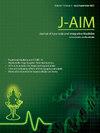Randomized double blind placebo controlled multicentric clinical trial of Ayush M-3 in the management of migraine- A study protocol
IF 1.9
Q3 INTEGRATIVE & COMPLEMENTARY MEDICINE
引用次数: 0
Abstract
Background
Migraine is acknowledged as an intricate and incapacitating neurological malady, profoundly exerting a potent influence on the health-related quality of life of patients causing disability, and augmented burden on families, and entire communities. Notwithstanding the strides made in the field of headache disorder management, there remains a cohort of migraine-afflicted patients who do not encounter satisfactory alleviation. This emphasizes the need for alternative systems in addressing the issue and there is a growing interest in exploring Indian system of medicine to address migraine symptoms. Objective: Due to the dearth of prospective, high-quality randomized controlled trials, this protocol aims to conduct a scientific study of the polyherbal formulation ‘Ayush M3’ to assess its safety and efficacy in patients suffering with migraine.
Materials and Methods
A prospective, randomized, double blind, parallel-group, placebo controlled, multi – centric, two-arm, exploratory study has been designed to enrol a total of 360 patients at three sites. Migraine patients with or without aura diagnosed as per International Headache Society-ICHD-III below Grade III of MIDAS will be randomized in a 1:1 ratio and administered the trial drug, Ayush M − 3 or placebo for twice a day after food for 16 weeks.
Outcome measures
The primary outcomes measures for the study will be changes in the character of disease in terms of frequency, intensity of headache as per VAS (0–10) and duration of episode of headache. Secondary outcome measure will be changes in MIDAS, MSQ2.1, changes in associated symptoms of migraine, change in the use of analgesics/symptom alleviating medication & Change in the required dose/withdrawal of Anti-hypertensive drugs if any. Assessment will be conducted on an interval of 28 days till 16 weeks and an intervention free follow up at the end of week 20.
阿尤什 M-3 治疗偏头痛的多中心随机双盲安慰剂对照临床试验--研究方案
背景:偏头痛被认为是一种复杂的、致残的神经系统疾病,对患者的健康相关生活质量产生深远的影响,造成残疾,并增加家庭和整个社区的负担。尽管在头痛疾病管理领域取得了长足的进步,但仍有一群偏头痛患者没有得到令人满意的缓解。这强调了在解决这一问题时需要替代系统,并且人们对探索印度医学系统来解决偏头痛症状的兴趣越来越大。目的:由于缺乏前瞻性、高质量的随机对照试验,本方案旨在对复方“阿尤什M3”进行科学研究,评估其对偏头痛患者的安全性和有效性。材料与方法一项前瞻性、随机、双盲、平行组、安慰剂对照、多中心、两组、探索性研究在三个地点共纳入360例患者。根据国际头痛学会- ichd -III诊断为MIDAS III级以下的先兆或无先兆偏头痛患者将按1:1的比例随机分配,并在进食后每天两次给予试验药物,Ayush M - 3或安慰剂,持续16周。结果测量研究的主要结果测量将是疾病特征的变化,根据VAS(0-10),头痛的频率、强度和头痛发作的持续时间。次要结局指标将是MIDAS、MSQ2.1的变化、偏头痛相关症状的变化、镇痛药/缓解症状药物使用的变化;改变降压药的剂量/停药(如有)。每隔28天至16周进行一次评估,并在第20周结束时进行无干预随访。
本文章由计算机程序翻译,如有差异,请以英文原文为准。
求助全文
约1分钟内获得全文
求助全文
来源期刊

Journal of Ayurveda and Integrative Medicine
INTEGRATIVE & COMPLEMENTARY MEDICINE-
CiteScore
4.70
自引率
12.50%
发文量
136
审稿时长
30 weeks
 求助内容:
求助内容: 应助结果提醒方式:
应助结果提醒方式:


